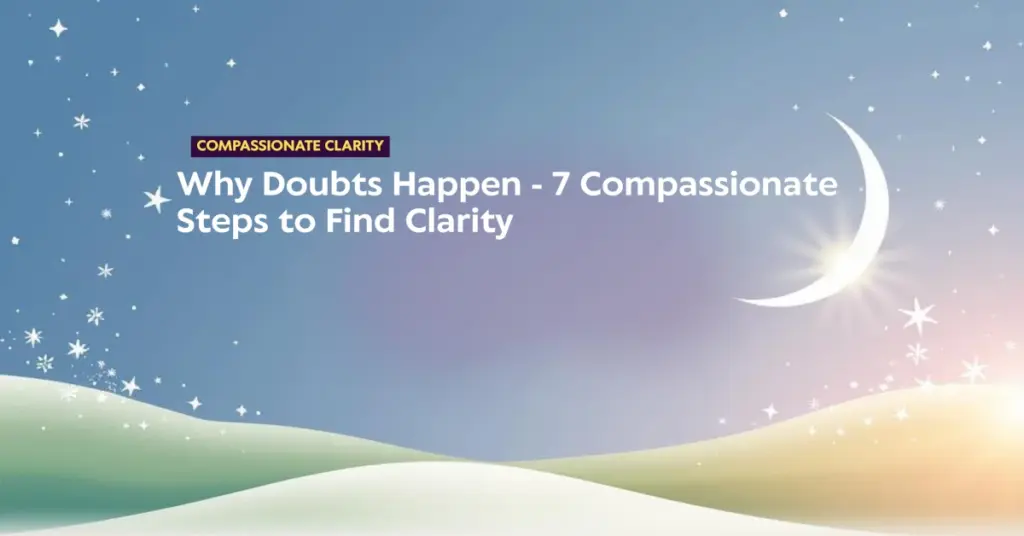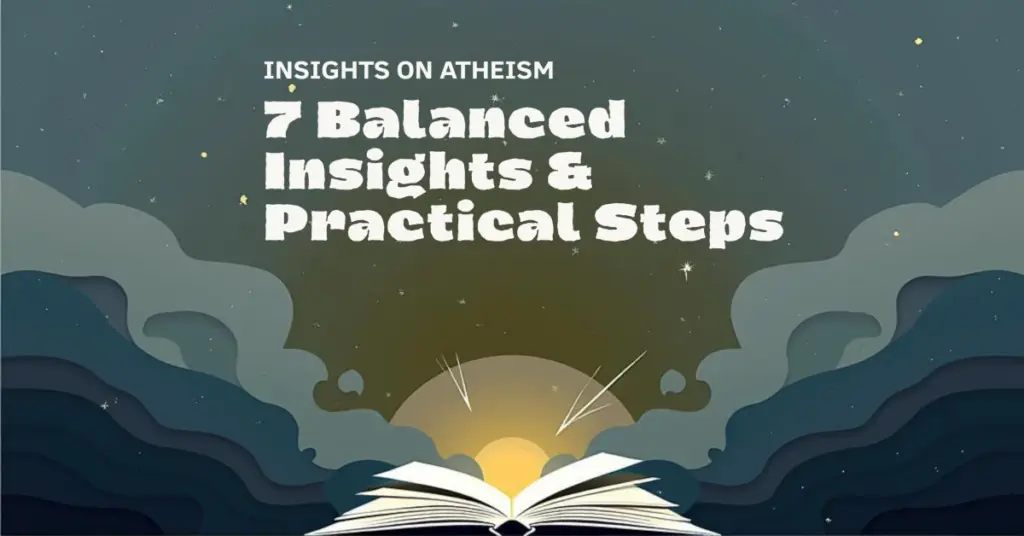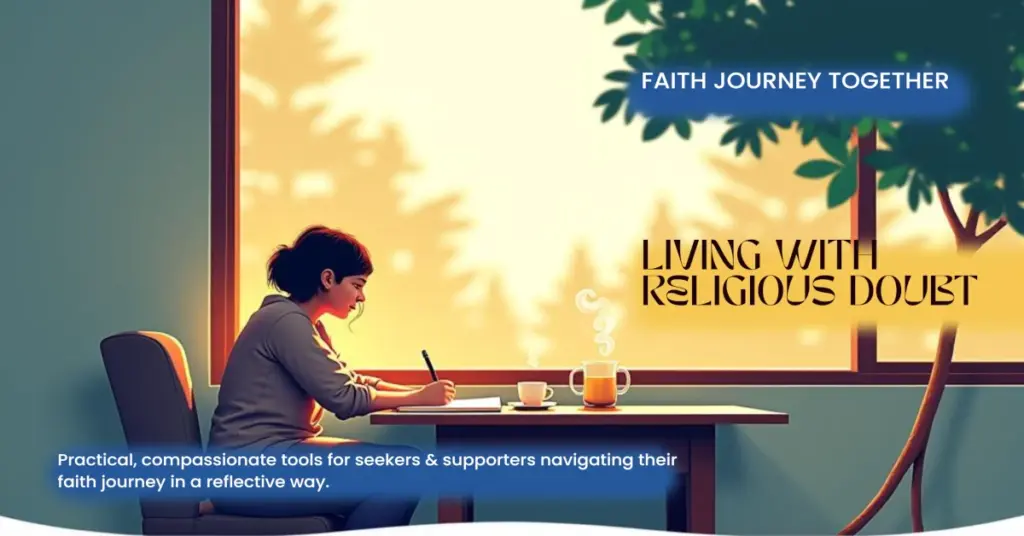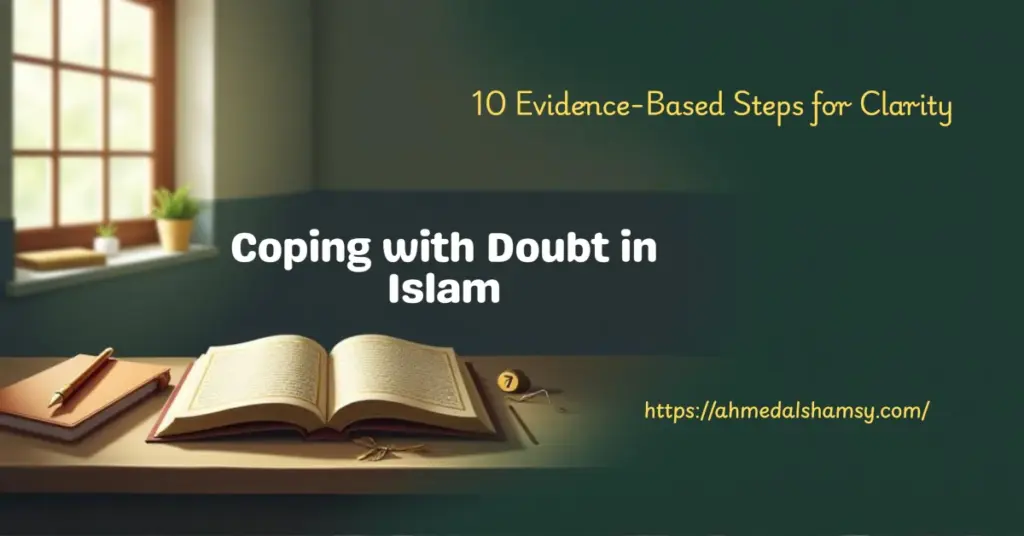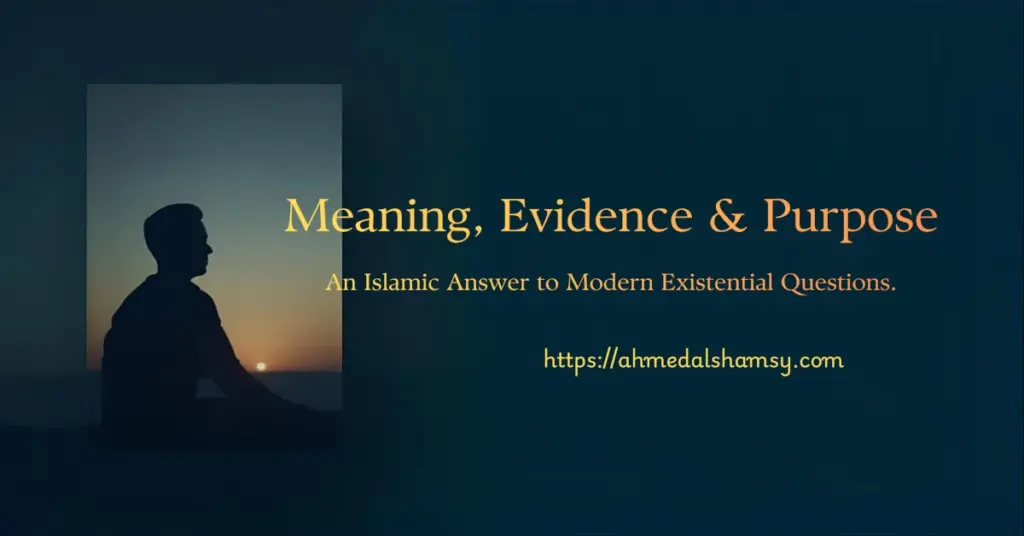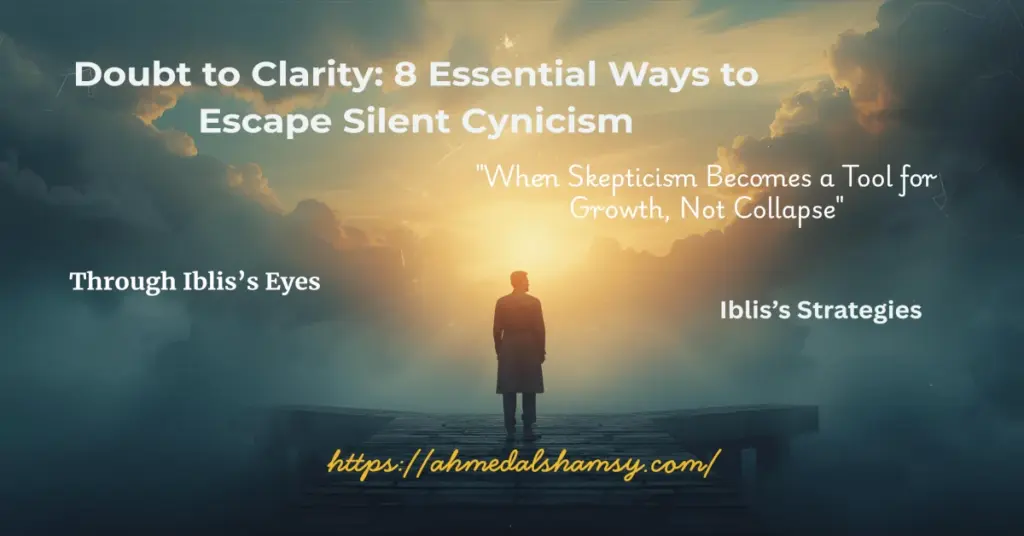AIM — Free & Open
CC BY-NC-SAAIM is free and open for non-commercial reuse. Try a free AIM pilot (CSV + memo) — support is optional and helps sustain translations, research, and free access.
Doubt is a natural and often constructive phase in many people’s spiritual journeys. This guide explains why doubts happen, maps common causes (intellectual, moral, emotional, social), gives compassionate, practical steps for seekers and supporters, and suggests safe next steps for study, conversation, and mental-health care. Inline references are included for readers who want to explore the sources.
Table of Contents
Introduction – normalizing the question: why doubts happen

If you are asking why doubts happen, you are far from alone. Questioning forms of belief — whether theological, ethical, or existential — is a widespread human experience. Doubt can surface during study, after a moral shock, during life transitions, or when new evidence seems to clash with previously held beliefs. The aim of this guide is not to push a single answer but to help you understand the common causes of doubt, how to respond compassionately, and which next steps tend to lead to clarity or renewed conviction for many people 1 2 .
Why Doubts Happen?, Doubt is not always an end point. For many, it is part of a deeper movement toward a more reflective, resilient faith or a well-considered non-belief. In other cases, persistent doubt may signal pain or mental health struggles that require support. This article maps both the intellectual and emotional landscape of doubt and offers practical, respectful pathways forward — for seekers themselves and those who wish to support someone in doubt. Read on for a structured, evidence-informed approach.
What doubt looks like – three common shapes
Why Doubts Happen, Doubt rarely looks the same from one person to the next. Still, we can roughly group typical experiences into three shapes: intellectual doubt, existential/moral doubt, and experiential or emotional doubt. Knowing which shape you (or someone you care about) is in helps pick the right response.
1. Intellectual doubt: questions about claims and evidence
Intellectual doubt arises when specific claims — historical, scientific, or logical — appear to conflict with previously accepted beliefs. Why Doubts Happen, A reader might encounter a historical claim, a scientific finding, or a philosophical argument that challenges an earlier simple explanation. For example, questions about the historicity of a text, discrepancies between different accounts, or apparent conflicts between empirical evidence and religious claims often trigger this form of doubt 3 4 .
Typical features:
- Focus on facts, documents, or logical coherence.
- Desire for better sources, clearer explanations, or a recheck of assumptions.
2. Existential or moral doubt: when life’s events feel incompatible with belief
Why Doubts Happen, Existential doubt often follows trauma, personal suffering, or encountering grave injustices. It’s the kind of doubt that asks: “If there is a caring God (or a moral universe), why did this happen?” This form of doubt is not primarily intellectual — it is moral and emotional: the world’s cruelty, injustice, or senseless suffering presses on the believer’s sense of meaning 5 6 .
Typical features:
- Strong emotion (anger, grief, disillusionment).
- Questions about meaning, justice, or divine character.
3. Experiential or spiritual doubt: absence of felt connection
Why Doubts Happen, Some doubt arises from a diffuse feeling of disconnection — prayer that feels empty, rituals that feel meaningless, or a slow erosion of the practices that once sustained someone spiritually. This kind of doubt can be gradual and hard to name: people may say they “feel different” or that “it no longer works” 7 .
Typical features:
- Boredom, emptiness, or waning motivation for prior practices.
- A sense of slowing or loss rather than a single intellectual objection.
Why doubts happen – root causes mapped

Why Doubts Happen, Understanding probable causes helps turn anxiety into action. Here are common, evidence-informed reasons why doubts happen, with practical implications for how best to respond.
Cause 1 – Intellectual tension and new information
Why Doubts Happen, People regularly encounter new facts, historical analyses, or scientific findings that challenge established narratives. When new information is misaligned with prior belief, cognitive dissonance can produce discomfort and doubt. The healthy responses to this are investigation, source-checking, and intellectual humility — not immediate dismissal or forced certainty [3][4].
Practical response:
- Gather reliable sources (primary texts, peer-reviewed articles, reputable historians).
- Talk to knowledgeable, trustworthy interlocutors — teachers, scholars, or mentors who value evidence and nuance.
Cause 2 – Moral shock and emotional crises
Why Doubts Happen, Experiencing or learning about deep suffering, abuse, or widespread injustice can create a moral upset that makes prior beliefs feel inadequate or dishonest. Doubt here is an ethical protest: the inner moral sense rebels at what seems like an unjust world [5][6].
Practical response:
- Honor the grief and anger; these are moral signals, not failures.
- Seek compassionate listeners or counselors who attend to moral wound and can separate spiritual questions from moral pain.
Cause 3 – Social and cultural change
Why Doubts Happen, People surrounded by multiple worldviews (e.g., in migration, university, or multicultural workplaces) often start comparing narratives. As social networks change, exposure to alternative life stories or lifestyles can prompt doubt. This is often a normative, identity-level struggle: new contexts make prior assumptions less believable or less attractive 8 .
Practical response:
- Explore comparative readings with intellectual charity. Learn about other perspectives without immediate pressure to decide.
- Keep relationships open; identity transitions often need time and social support.
Cause 4 – Spiritual dryness or ritual fatigue
Why Doubts Happen, Routine without meaning causes erosion: when ritual or practice continues without felt connection, people can feel that belief is superficial. This can be reversed by changing practice, exploring new forms of spiritual engagement, or honest reflection on whether practices still serve one’s life [8].
Practical response:
- Try small, intentional practice changes (short reflection, journaling, service).
- Reconnect through community or new forms of spiritual expression (study groups, art, nature).
Cause 5 – Intellectual honesty and growth
Why Doubts Happen, For many thoughtful people, doubt is the byproduct of intellectual growth. As complexity increases, certainties may fall away — not because belief is false, but because a mature relationship to truth is more tentative and exploratory [1] 9 .
Practical response:
- Treat doubt as a sign of seriousness, not defeat. Read deeply and cultivate dialogue with thoughtful mentors.
Practical next steps for seekers (a compassionate roadmap)
Why Doubts Happen, If you are experiencing doubt, the following practical steps are designed to offer clarity, care, and forward motion. They combine study, relational support, and practices that help both intellectual and emotional wounds heal.
Step A – Name the doubt precisely
Vague anxiety is harder to address than a clear question. Ask: “Is my doubt about a historical claim, an ethical problem, an emotional experience, or a combination?” Write it down in one sentence. If the doubt is a cluster, try to identify the single most pressing question first 10 .
Step B – Use a three-track approach: learn, feel, and practice
- Learn (intellectual track): Gather 3–5 reputable sources that directly address your question. Prefer primary texts, scholarly introductions, and balanced overviews rather than polemic blog posts.
- Feel (emotional track): Allow yourself to name what you feel — anger, loss, confusion. Speak to a listener with empathy (a friend, pastor/imam/mentor, or counselor).
- Practice (spiritual track): Take a small habit that connects to your values (a five-minute reflection, a walk, an act of service). Ritual or ethical practice can reveal new meanings even while intellectual questions remain.
Step C – Build a reading list and timeline
To find Why Doubts Happen, Don’t try to fix everything at once. Assemble a modest reading list (3–6 items) and give yourself a timebox (a month or two) to read and reflect. Keep a short journal entry after each piece: “What moved me? What unsettled me? What are the unresolved questions?”
Step D – Seek honest dialogue, not debate
Find people who will listen and engage with curiosity. Avoid “debate” mode if you need processing; argue later if you must. Questioning in a non-hostile context tends to produce better learning and less defensive posturing [4] 11 .
Step E – Consider professional help if needed
If doubt is accompanied by severe anxiety, depressed mood, suicidal ideation, or functional decline (unable to work, sleep, or eat), seek a licensed mental health professional promptly. There’s no shame in receiving care; distress can mask or amplify doubts in ways that require clinical attention 12 .
How friends and communities can support someone in doubt

Why Doubts Happen, If you are supporting someone who’s doubting, your role is vital. Small actions often matter more than arguments.
Don’t rush to fix
Avoid rapid-fire apologetics or “conversion” attempts. The immediate need is often being heard and held in the confusion.
Provide a listening space
Use reflective listening: “It sounds like you’re feeling X because of Y.” Validate emotions without necessarily endorsing conclusions.
Offer resources, not ultimatums
Ask permission before recommending books or lectures. If they say yes, offer one or two balanced resources rather than a long reading list.
Keep relational ties strong
Doubt can be isolating. Maintain invitations to shared activities (a coffee, a walk, practical help) that preserve relationship while the person processes.
Watch for signs of crisis
If the person expresses hopelessness, self-harm, or severe withdrawal, help them access professional support immediately — this is a safety issue beyond theological debate.
Stories of doubt and renewal (short vignettes)
Why Doubts Happen, Human stories reveal patterns. Here are brief composite vignettes (blended from many real-life cases) showing how doubt can lead to different outcomes.
Vignette 1 – The academic skeptic who became a scholar
A university student encounters new historical-critical methods and experiences intellectual doubt. Rather than abandon the tradition, they enroll in a focused course, read primary sources, and found a mentor who modeled integrity. Over time, they regained a nuanced faith with an informed intellectual humility.
Vignette 2 – The moral doubter who pivoted to service
A person whose faith faltered after witnessing injustice found that practical service was the bridge back to meaning. Action helped resolve moral outrage into agency and renewed connection to ethical roots.
Vignette 3 – The person who left and found peace
For some, doubt leads to a sincere change in belief. Leaving a faith can be painful but honest. Over time, many former believers build authentic, value-driven lives and new communities that match their convictions.
These vignettes show there is no single “correct” endpoint; the ethical aim is personal integrity and flourishing.
FAQs
Q: Are there “dangerous” doubts that should make me leave community?
A: Doubts are not inherently dangerous. But if community or leaders respond with shaming or coercion, that is harmful. Healthy communities tolerate questioning and provide space for learning. [2][11]
Q: Will I lose my moral compass if I doubt?
A: Not necessarily. Many people who doubt maintain or deepen ethical commitment; doubt can sharpen moral reasoning when processed well. [6][8]
Q: How can I talk to family who fear my doubt?
A: Be patient, reassure them you value relationships, and set clear boundaries about what you will discuss. Offer to revisit conversations when emotions are calmer.
Practical exercises (for the next 30 days)
- Name it aloud once a day: write a one-sentence description of your doubt.
- Read 10 pages a day: pick one balanced book addressing your main question.
- Two-minute reflection: each evening, note one thing you are grateful for.
- One relational act weekly: invite a friend for coffee or help someone in a concrete way.
These small acts build steadiness even as questions remain.
If you’re supporting a young person who doubts
- Create a safe space — avoid punishment for questions.
- Encourage curiosity: suggest accessible resources, not polemic sources.
- Help them find mentors who are both intellectually honest and compassionate.
- Help them access counseling/support if mood or functioning decline occurs.
Final reflections – doubt as a doorway not a sentence
Why Doubts Happen, Doubt need not be an ending; it can be an invitation. When guided by careful study, compassionate listening, and small practices that reconnect us to community and meaning, doubt often leads to a more honest and durable life stance. Whether the outcome is renewed faith, transformed belief, or sincere non-belief, the ethical aim is integrity: living in a way that aligns belief, reason, and compassion. If you are in doubt today, know you are in good company — and that careful, compassionate steps can move you toward clarity and peace.
References
- William James — The Varieties of Religious Experience (1902).
→ “Classic, readable exploration of religious belief, conversion, and doubt — excellent for historical and philosophical perspective on why people doubt and how religion functions psychologically. & Jennifer Michael Hecht — Doubt: A History (2003). → A readable cultural history of skepticism and doubt across Western history; useful for background and narrative framing. ↩︎ - Scholarship on faith development and intellectual humility
James W. Fowler — Stages of Faith: The Psychology of Human Development and the Quest for Meaning (1981).
→ Seminal book describing developmental stages of faith; helps explain how questioning can be part of growth. & Ian M. Church, Linda J. Griese (eds.) — Intellectual Humility: A Theory and Research Agenda (selected journal articles).
→ See recent psychology literature on intellectual humility (look for review articles by Maria C. (or Mark) Leary, Paul R. R. et al. if you want peer-reviewed summaries). ↩︎ - Historical-critical and apologetic literature (for intellectual doubts about texts and history)
Bart D. Ehrman — Misquoting Jesus: The Story Behind Who Changed the Bible and Why (2005).
→ Clear introduction to textual-critical issues (useful where readers’ doubts come from manuscript/ transmission questions).
Richard Carrier, Bart Ehrman, Daniel B. Wallace (select articles & debates).
→ Useful to present both critical and skeptical scholarly views when readers are investigating textual claims. ↩︎ - Cognitive science and belief-change studies
Hugo Mercier & Dan Sperber — The Enigma of Reason (2017).
→ Explores why human reasoning is often argumentative and social rather than purely truth-seeking — helps explain why new evidence sometimes increases belief rather than reduces it.
Select review articles on cognitive dissonance and motivated reasoning in social psychology (e.g., Festinger’s classic theory and modern experimental updates). ↩︎ - Moral injury, trauma, and existential doubt
Jonathan Shay — Achilles in Vietnam: Combat Trauma and the Undoing of Character (1994).
→ Introduces moral injury and how trauma can shatter meaning — highly relevant for moral/existential doubt.
Litz, Neria, et al. — work on moral injury (2009 onward) — look for Litz et al.’s key review papers on moral injury and clinical implications (useful for linking trauma → theological doubt). ↩︎ - Social and identity studies (how context & networks affect belief)
Peter L. Berger & Thomas Luckmann — The Social Construction of Reality (1966).
→ Classic sociological account of how social world-shaping influences belief and identity transitions.
Recent sociology-of-religion studies on secularization, migration, and religious switching (look for reviews in Sociology of Religion or Annual Review of Sociology). ↩︎ - Spiritual-practice manuals & habit-change research (practical steps)
James Clear — Atomic Habits: An Easy & Proven Way to Build Good Habits & Break Bad Ones (2018).
→ Practical, evidence-backed habit formation techniques that work well for small spiritual practices and ritual repair.
Books on spiritual practices (e.g., Richard Foster — Celebration of Discipline; Dallas Willard — The Spirit of the Disciplines). These show concrete spiritual exercises that restore felt meaning. ↩︎ - Comparative religion & introductory resources
Huston Smith — The World’s Religions (1958; later editions).
→ Clear comparative overview of major religious traditions — helpful for seekers exploring other faith perspectives.
John Bowker — The Oxford Dictionary of World Religions (or similar). Useful reference. ↩︎ - Case-study collections and personal narratives
Graham Oppy / Michael Ruse (collections vary) or anthologies such as Leaving the Fold (ed. Marlene Winell et al.) — look for compilations of personal stories of doubt and religious change.
Personal memoirs provide narrative context (e.g., works by well-known converts or deconverts depending on your target audience). ↩︎ - Practical counseling and pastoral-care resources
Henri J. M. Nouwen — The Wounded Healer (1972).
→ Classic on pastoral presence and how caregivers accompany suffering people (useful for how to listen to someone in doubt).
John Patton — Pastoral Care in Context: An Introduction to Pastoral Theology (2000s eds).
→ Practical frameworks for pastoral accompaniment and boundaries. ↩︎ - Communication, facilitation & listening guides
Marshall B. Rosenberg — Nonviolent Communication: A Language of Life (1999).
→ Practical skills for listening and reflective responses — directly applicable to supporting someone in doubt.
Priya Parker — The Art of Gathering: How We Meet and Why It Matters (2018).
→ Useful for structuring safe conversations and interfaith dialogues. ↩︎ - Mental health & crisis resources (when to refer to professionals)
World Health Organization (WHO) — Preventing Suicide: A Global Imperative (2014) and related WHO resources.
American Psychiatric Association (APA) / National Institute for Health and Care Excellence (NICE) guidelines for assessment & referral in cases of severe depression or suicidal ideation.
→ Use these to justify the “seek professional help” guidance and for local referral standards. ↩︎
Discover more from Ahmed Alshamsy
Subscribe to get the latest posts sent to your email.

